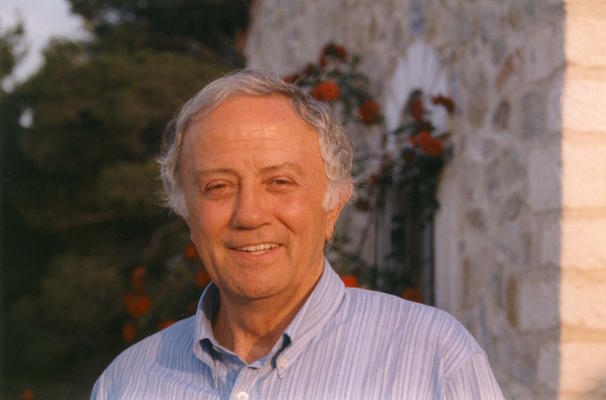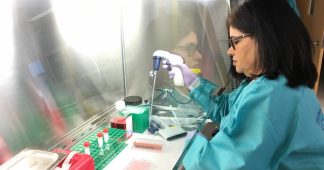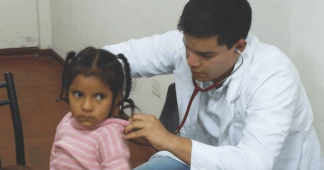May 18, 2022
Prof. George Vithoulkas is interviewed by Dr. Manish Bhatia about his theories of health and disease including his recent teachings on the role of the microbiome in chronic diseases.
George Vithoulkas is today Honorary Professor at numerous universities including Univ. of the Aegean, State Medical U. of Chuvash Republic (Russia), National Educational Centre for Traditional and Complementary Medicine (Russia), Pontifical Javeriana Colombia), All-Russia Scientific Research Center for Restorative and Resort Medicine of the Ministry of Health of Russian Federation, PHEE “Kyiv Medical U.”, Dnipro Institute of Medicine (Ukraine), and is Doctor Honoris Causa -“Dr. Viktor Babes” U. Timisoara (Romania) Doctor Honoris “Iuliu Hatieganu U. (Romania) and Professor at the Kiev Medical Academy.
Prf. Vithoulkas is a Senior Associate Member of the Royal Society of Medicine, UK, Honorary Member of Liga Medicorum Homeopathica Internationalis and Honorary President of the Hellenic Homeopathic Medical Association (established 1970) In 1996, he was honored with the Right Livelihood Award (also known as Alternative Nobel Prize, www.rightlivelihood.org) “…for his outstanding contribution to the revival of homeopathic knowledge and the training of homeopaths to the highest standards”.
His main contributions to medicine include:
“The Levels of Health”
The Continuum of a Unified Theory of Diseases ,
How an acute inflammatory condition could be transmuted to a chronic disease,
The Definition of Health and How Can Healthier Children be Born?
MB: Prof. Vithoulkas, it is my utmost pleasure to interview you once again. You have recently published a very interesting paper about the role of our microbiome in the transmutation of acute inflammation into chronic inflammation. This seems to be in line with your Unified Theory of Disease and your earlier ground-breaking work on Levels of Health.
I would like to start this interview with some questions about how this evolution occurred. To make our readers understand this concept better, I would like to begin with some practical questions.
MB: In my own practice, I have observed that treating a migraine headache or asthma or dermatitis or gonorrhoea is easier compared to treating Parkinson’s’ disease, Alzheimer’s, Multiple Sclerosis, Dementia etc. Why is this difference observed even when a close simillimum is found?
GV: Dear Manish, I am also glad we meet again to discuss matters concerning the practice of homeopathy. Your observation is correct. The right homeopathic remedy – the simillimum as we call it – may bring about a total reset in some chronic cases but may only slightly affect or have no effect on other chronic degenerative diseases.
Most probably this happens because some important organs of the body, or a system, have deteriorated to such a degree that there is no way of restructuring such an organ or system. The strange thing is that, even if a diagnosis of an incurable chronic condition has been established, let us say in M/S or ALS etc., the real potential of the organism for recovery is not the same for every case.
So, in a patient with myasthenia gravis, multiple sclerosis, or any neuromuscular diseases that are considered incurable, if the indicated remedy is clear, the organism may react with surprising vigor and eventually, the case may reach complete recovery.
MB: I have also observed that some types of cancers, which is a dreaded but common disease today, seem to have a better prognosis than many neuro-degenerative diseases. What is your observation and why would this difference exist?
GV: Cancers are of a different degree of malignancy, so some of them are manageable with homeopathy. Cancerous tumors indicate an aggressive reaction of the organism that appears to be under stress for a long time.
The manifestation of a malignant tumor is actually a reaction that indicates that the organism cannot tolerate a stressful situation anymore and needs an outlet. But if the toxic situation is corrected or stops affecting the patient, a recovery could be possible as long as the organ in which the tumor manifested has not been destroyed beyond the possibility of repair.
In such cases, the homeopathic remedy can do wonders. But this condition is much milder than, say, the deterioration of the whole nervous system that produces pathologies like ALS, Parkinson’s, Myasthenia gravis, Multiple Sclerosis and all such neuromuscular diseases that are much more difficult to cure.
But having said this, still, it is irresponsible for us to claim that we can cure all cancer cases.
MB: So, it again boils down to our own individuality and the extent and severity of the pathology.
GV: My conclusion, based on long years of observation on treating chronic diseases, indicates that there is an ‘overall degree of health’ that each one of us possesses that does not correspond directly to a conventional diagnosis even when it concerns serious chronic diseases.
The term ‘overall degree of health’ is different from the degree of health indicated by disease markers confirmed by a laboratory. It is not directly related to the WHO classification of chronic diseases.
I will give an example. There are cases of multiple sclerosis that can be eliminated by the correct remedy in a particular patient and there are the same symptoms in another patient that cannot be eliminated, even with the best prescribing. What is the inner factor that determines the different reactions?
It is very difficult to know, yet it must exist, given the fact that different organisms with the same pathology react in a different way after the correct remedy. There is a possibility that this degree of health one day will be established through a certain marker. Perhaps the number of telomeres will be one of the markers that will define the degree of the overall health of each one of us.
In conventional medicine, they have no such problems, or I could say such qualms, since the same drug will be given to all patients in any case.
MB: How do we deal with these limitations as a homeopath?
GV: For a homeopath, all these problems constitute a reason for thought and research. Finding the parameters that constitute the ‘overall degree of health’ is important in order to get an idea about the reaction that your remedy will have on the patient.
For instance, we have a parameter well known to all of us that the deeper the pathology, the less the guiding keynote symptoms that will help us find the correct remedy.
In my theory “Levels of Health”, I tried to give the signs, the symptoms and the general parameters, so anyone can find for himself the degree of the chronic state in which he is situated. Though my book “Levels of Health” has been written for health professionals and is most useful to homeopaths, it can also be read easily even by a layperson.
MB: Your “Levels of Health” book does give a clear prognostic pathway. How has it evolved into your more recent work on human biome and suppression?
GV: In my recent paper “An integrated perspective on transmutation of acute inflammation into chronic and the role of microbiome” published in the medical journal “Medicine and Life”, I have tried to go one step further in the investigation of how one could understand the degree of health one has.
I have given more tangible information about what takes place within our organism as we grow older and are subjected to the natural deterioration of health.
This is when we expect our immune system to counter the pathologies that originated from all the ingested chemical medical and non-medical drugs, vaccines, pollution, as well as pathologies arising from the effects of severe psychological stresses.
This is the time (during stressful time) that predispositions to different diseases can manifest, and a chronic disease takes over the whole organism if the immune system has been compromised.
I have pondered as to which organ of our body could register such changes and be detected. My understanding was that this lies with the composition of microbiota, in the balance of micro-organisms within the digestive system, and particularly in the mucus membranes of the guts.
MB: In your earlier paper ‘The continuum of a Unified Theory of Diseases’, you suggested that suppression of diseases, through excess of chemical drugs or other means, many times overwhelms the body’s natural defenses and forces the immune system to compromise and start a deeper line of defense, which then constitutes the beginning of a new chronic condition. Please tell us a bit more about how you reached this conclusion and what has been your observations about it?
GV: Your question is simple but the answer is very complex. I will try to answer it but I do not know how easy such an answer could be.
As you know, I have been treating whole families for many years. This, I think, is a great advantage for a clinician who then can observe the manifestation of different chronic diseases, their development and their probable causation.
The human organism is built in such an evolved and complex way that it can remember the big malignant stresses that the immune system was registering and was not able to eliminate right on the spot in order to bring about a total reset.
The results of such stresses manifest as signs and symptoms heralding the manifestation of a chronic condition. Such an evolution was happening in all such cases where the immune system has been already in a compromised state due to stress.
In every patient suffering from a chronic disease, you will find this precondition to be true: the partial compromise of the immune system.
I will give you an example. There is a female patient who is oversensitive and in the history of her case you discover that she was mistreated by her mother for years but did not talk about it with anyone; she hid her anger against her mother. This long conflict has undermined the health of this girl and finally is expressed in a state of extreme irritability coupled with constipation.
Living for years in this toxic environment, she survives by treating her condition with a mild sedative and a laxative. So far there are no diagnoses of any chronic disease. Then, suddenly, she falls ill with a cold that develops quickly to double pneumonia which is treated with a series of antibiotics.
Not long after such severe treatment of the acute condition, she develops symptoms of an autoimmune disease like ulcerative colitis together with depression, while the anger and the irritability are reduced. In this state of health, she comes to the homeopath for treatment.
You may treat these sorts of cases successfully for quite some time with the correct sequence of remedies but, while they are feeling much better, you observe suddenly they develop again a pneumonia just like the one they had ten or fifteen years ago.
You continue treating the pneumonia with homeopathy. The patient seems quite well: free from pneumonia, free from ulcerative colitis and free from depression. However, the patient comes to you again to be treated as she now feels the return of the emotional state she had fifteen years ago, namely the sudden explosions of anger and the constipation. You keep on treating the irritability and constipation and eventually they have their overall health back.
This is a usual series of events that I was observing during the correct homeopathic treatment. The organism goes back in time to the previous stress period that had caused the problem and which, if they are also treated properly, a complete recovery ensues.
Such were the cases I was seeing through all my years of professional practice which led me to write the “The Continuum of a Unified Theory of Diseases”.
Such a story is irrelevant to a conventional medical doctor or a half-educated homeopath who cannot see the connection between all these series of events.
When you medically follow thousands of such patients for many years, you are able to see the causative factor and the development of chronic diseases. You may observe on the one hand the causation and development of the chronic disease and on the other hand the unravelling of the pathology due to the correct homeopathic treatment.
Needless to say, if you treat the return of pneumonia again with antibiotics, the whole pathology of ulcerative colitis will come back, which again confirms that the antibiotics were originally responsible for the ulcerative colitis.
This is a simplified way of explaining what kind of observation led me to the idea of the “Continuum of a Unified Theory of Diseases”.
I eventually came to the conclusion that any negative stress either from chemical, medical, biological or psychological reasons, which were not counteracted at the time by an automatic reset, would leave its mark on the organism as a group of symptoms.
The organism will never forget the damage that was done five, ten or twenty years ago. Such traumas are compromising the overall health of the individual for good and will create a host of symptoms that will herald the beginning of a chronic disease.
MB: Coming to your recent paper on the effect or role of microbiome in causing the disease process, how does your earlier work on the levels of health and the continuum theory relate to your recent work on microbiome? Does suppression or use of chemical drugs affect the microbiome?
GV: I will try to give you the overall experience that led me to the decision to write such a paper. It is not easy, as I will try to combine a lot of different aspects, observations and thoughts from my over 60 years of practicing homeopathy.
Due to the detailed way in which we take a case in homeopathy, we have the possibility to observe several phenomena: for instance, when an organism underwent a severe grief, for example, the separation from a lover or a severe virosis, the first thing we observe is the loss of appetite indicating that such emotional traumas have an impact on the digestive tract.
It appears as if there was existing in the guts a very sensitive organ that registered any psychological or physical stress, that could eliminate the desire to eat, which is such an important function for the survival of life!
MB: Yes, indeed! I treat a lot of autistic children and see this gut-brain connection often.
GV: Furthermore, I had observed that many chronic diseases were accompanied by changes in the preference for food intake, an excessive desire or aversion for certain foods, something that was interesting for a homeopath to observe and to take into consideration in prescribing. It was interesting to see that these apparently innocuous changes were related exclusively to the digestive system and were connected with several pathological conditions.
Apart from all these facts, it was also well-known that antibiotics and all the different anti-inflammatory drugs were having side effects, affecting primarily the human flora in the gut. This influence was so obvious in the medical history of the patient that doctors advised patients to take several vitamins and probiotics together with the medications, in order to protect the flora from the medications. Today it is common knowledge that all medications have side effects, which are noted in the flyers accompanying them.
For instance, the start of a chronic condition after a virosis was recognized as a new syndrome: the post viral syndrome which is a severely compromised state of the immune system. Then I searched through the recent medical literature where I found a lot of articles, in prestigious medical journals, that reported similar cases as the ones I had observed fifty years ago!
Therefore, I concluded that something important was happening in the guts with the trillions of bacteria, fungi, microbes, viruses and all the other microbes that we were calling with the generic name “microbiome”.
I used to see all the side effects of conventional treatment in the patients during the years 1960 to 1980. All those traumatized patients were coming with a chronic condition to try a different therapy.
In the taking of their cases in a detailed manner, I was able to see the changes that were happening in their organisms. For instance, I was impressed with the reactions that organisms had in the guts when they were under stress.
I had noticed for instance the development of anxiety neurosis after the treatment of typhus and the correlation to the alimentary canal. These patients with anxiety neurosis usually focused, in an almost hypochondriacal way, on the dysfunction of their alimentary system.
But there were so many other conditions that the guts were participating in. For instance, if somebody had an important meeting his anxiety caused him to go to the bathroom with sudden diarrhea. How could such a reaction be produced unless the balance of the different microorganisms was disturbed due to an emotional stress.
A sudden shock like the loss of a lover could bring about, except for the sadness, severe nausea or diarrhea. The strong feelings of a sudden financial loss could bring about, within a short time, a condition of constipation.
The question was, why the guts were reacting with such speed in so many different stressful psychological situations. For any person with clinical experience, these phenomena would pose a logical question: Which was the primary organ that was responding to such sudden changes in the emotional level?
Of course, it was obvious that different explanations could be given, but which was the main organ that was excited to react in such speedy manner from the guts?
For any objective observer, the microbiota within the guts was most probably the main reason for such changes. Most probably the composition and the proportions of different types of microorganisms were changing.
Their symbiotic or dysbiotic states determined what was happening in the whole organism affecting all three levels of the human being: the mental, the emotional and the physical. The responsible entity -for all these changes in the emotions -is most probably a ‘new organ’ with trillions of minute parts that we call ‘microbiota’.
This ‘organ’ that is constituted from one hundred trillions of different microorganisms is first in line to be reacting. It is the same “organ” responsible for the transformation of matter (food) to energy, regulating in this way a lot of other functions of the human organism. This ‘organ’, being tremendously sensitive, appears to be struggling all the time to keep the best possible balance, the homeostasis, by possibly changing its composition every time in the reciprocal proportions of different microorganisms within the guts.
What I am going to say now maybe is a far-fetched idea, but we may conclude that there are special bacteria or viruses that appear to be responding to the different kinds of feelings or impulses or stresses. But what is most interesting is that these little ‘microorganisms’ are the happiest when we fall in love. In such a case, it seems that almost in a magical way in an instance all of these fellows conspire to give us a feeling of completeness, of sublime happiness and a feeling of living in heaven. In such a case, there is a possibility that even a person who was suffering from a chronic condition may recover in a miraculous way.
But on the contrary, there is a total catastrophe if such a sublime “love affair” is interrupted suddenly, then from heaven, the person is now living in hell. Which could be the organ that could be responsible for such a radical change that comes with such terrific force and speed affecting the whole organism, overwhelming the whole human being?
This is the most obvious evidence of this fact, that microbiota is the first “organ” to be affected. This fact, concerning the effect on microbiota, can be seen in the side effects of all the medicinal substances -whether chemical drugs, antibiotics, hormones or vaccinations. Most of these medicinal substances have a deep influence on the microbiota, producing side effects, whether of a major or lesser degree.
The interesting thing is that all medical personnel today have accepted this idea of side effects of medicines as ‘normal’, adding that medical drugs cannot function any other way but to have side effects!
The problem is that not all health practitioners realise that each organism has its own ‘red line’, and if crossed, new diseases of a chronic nature may emerge. Different disease predispositions that were lying dormant in the depth of our genetic codes will wake up and overwhelm humanity, if we continue to bombard these microorganisms with chemical drugs.
I had mentioned the same thing in 1985 in my book “A New Model for Health and Disease” but, of course, little notice was taken, as I believe will similarly happen with this paper as well.
Anyhow these are some of my thoughts, dear Manish, which prompted me to write this article. If what I have observed is correct, then we have to realise that we are dealing with a “new organ”, very much alive and functional within us, that we call the ‘microbiome’ and which is hosted by our guts.
I believe that by looking at the microbiota we have opened a new window into the workings of the human organism that will give us a lot of interesting information in order to understand better the behavior of the human organism in health and disease.
Microbiome is an ‘organ’ of our physical body that has its own rules and antagonisms. It responds to our everyday feelings with their ups and downs, with our sufferings and our happiness. These battles are going on all the time -in a parallel way with our conflicts- in order to attain a perfect symbiosis, a homeostasis, a perfectly healthy condition.
What is interesting is that this ‘organ’ can be affected by our feelings but also, we can feel its reciprocal reaction when it is traumatised by junk food and strong chemicals.
Such an organ must be treated with the utmost care and respect if we do not want to provoke deeper genetic pathologies that are lurking within our predispositions, ready to pop up and create finally, God knows, whatever kind of terrifyingly sick personalities.
In any case, I hope that the world will soon realise the importance of homeopathy, which is the most peaceful and effective medicine, in order to bring about balance and happiness within us and peace to our environment.
MB: I absolutely agree with you Prof. Vithoulkas. There is a lot of research happening on the gut-brain connection, the role of microbiome in defense and disease and scientists believe that we have still only explored what is the tip of an iceberg. Much more research is required and I hope your thoughts will stimulate not just homeopaths but other scientists too to research further the role of changes in gut microbiota in both disease and cure.
I would like to thank you for your precious time today and for sharing your remarkable observations on disease evolution and the role of our microbiome in it. Thank you so much!
We remind our readers that publication of articles on our site does not mean that we agree with what is written. Our policy is to publish anything which we consider of interest, so as to assist our readers in forming their opinions. Sometimes we even publish articles with which we totally disagree, since we believe it is important for our readers to be informed on as wide a spectrum of views as possible.










